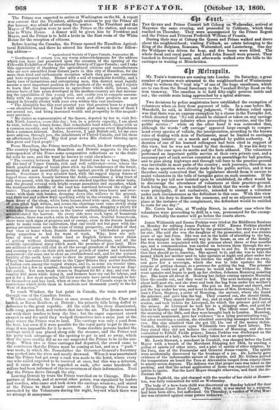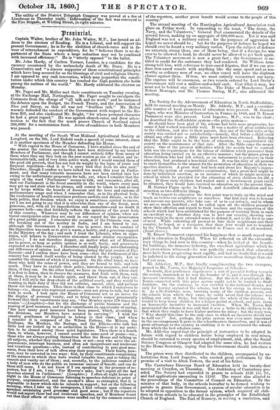311ttrupn1is.
Mr. Train's tramways are coming into London. On Saturday, a great number of persons were attracted to the neighbourhood of Westminster Abbey to witness the "trial trip" of one of the huge omnibuses, which are to run from the Broad Sanctuary to the Vauxhall Bridge Road on the Iron tramway. The omnibus is to hold fifty-eight parsons inside and out; the outside seats being approached by a spiral staircase.
Two decisions by police magistrates have established the exemption of volunteers when on duty from payment of tolls. In a case before Mr. Mansfield, he said, in delivering judgment, "the defence relied upon was that there was an express exemption by. a clause in the Turnpike Act, which directed that No toll should be claimed or taken on any carriage conveying volunteer infantry when proceeding to exercise, and the like public service ; ' while on the. other hand it was contended that, although the words art, carriage' appeared large enough to compre- hend every species of vehicle the interpretation, according to the known rules of dealing with Acts of Parliament, must be limited to carriages conveying infantry on a march and supplied by public authority. A decision of one of his learned colleagues had been cited in support of this view, but he was not bound by that decision. It was his duty to judge of the case upon its merits and the facts adduced. The volunteers performed an important public service at their own private cost, and a necessary part of such service consisted in an assemblage for ball practice, and to pass along highways and through toll-bars to the practice-ground was inevitable in most parts of the country ; such journeys, therefore, as the one in question were clearly made for the public service, and it was therefore easily conceived that the legislature should deem it unwise to mulct volunteers in the tolls of turnpike gates on such occasions. If the liability to pay toll now insisted upon be established, its effect would be to discourage the attendance of volunteers at their practice-ground. Such being the case, he was inclined to think that the words of the Act were principally, if not exclusively, intended to exempt a volunteer under such circumstances as the defendant in this case. With this view he felt it his duty to dismiss the summons, and as an adjournment took place at the instance of the complainant., the defendant would be entitled to costs for one day."
Mr. Corrie has also, at Worship Street, in another case where the volunteers were proceeding to drill in a van, pronounced for the exemp- tion. Probably the matter will go before the courts above.
James Wildsmith and Emma Perkins were tried at the Middlesex Sessions on. Monday for robbing James Perkins of 1151. Emma Perkins pleaded guilty, and was called as a witness by the prosecution ; her story is a singu- lar one. She said she was the daughter of the prosecutor, and was sixteen years of age last June. She was not in the habit of attending to the bar, but was engaged in the ordinary way in the house, as one of the family. She first became acquainted with the prisoner about three or four months ago, and a communication was carried on between them through the ser- vant, Johanna Manning. She took messages, to and fro. It was proposed that they should go to America. She agreed to it, and she was to take the money which her mother used to take upstairs at night and place under her bed. The prisoner came into the kitchen the night before she ran away,
and gave her a sovereign which she was to take upstairs for the purpose of getting change' as a pretence for getting the bag. The prisoner
said if she could not get the money he would take her without it. She went upstairs and began to pack up her clothes, Johanna Manning assisting her. She knew all about it. Hearing her father coming upstairs Manning blew the candle out, and they went to bed. The next morning she got up about half-past six, and she went and took the bag from under her mother's pillow. Her mother was asleep. She put on her bonnet and shawl, and put the bag under her arm and went to the house of Mrs. Downing, 21, Dun- stan's Place, Stepney, a sister of Manning, the servant, where she found the prisoner, and gave him the bag. They counted out, she should think, about 100/. They stayed there all day, and at night started to the Easton station, and took tickets for Liverpool, for which the prisoner paid out of the money. At Liverpool he took her to a shipping office, and paid for tickets to Quebec and thence to New York. The officer came on board on the morning of the 20th, and they were brought back to London. Manning, the. servant mentioned, gave her evidence "in a lying prevaricating way," but after receiving a caution, she admitted conveying messages between the two. She also admitted that she got 121. 15s. out of the money stolen. Verdict, Guilty ; sentence upon Wildsmith two years' hard labour. The Jury stated they did not believe the evidence of Manning, and she was committed to Tothill Fields prison; Emma Perkins was discharged on the recognizances of a lady, who has kindly taken her as an apprentice. Mr. Lewis Stewart, a merchant in Cornhill, was charged before the Lord Mayor with a breach of the Merchant Shipping Act 1854, by sending a gallon of spirits (of ether nitre and a pint of spirits of ether sulphur, by the Pera, one of the Peninsular and Oriental steam-vessels. The spirits were accidentally discovered by the breakage of a jar. Dr. Letheby gave evidence of the inflammable nature of the spirits, and Mr. Gillson proved the temperature on board the Pura at Alexandria ranged from ninety-three to ninety-seven degrees. The defence was that proper care was taken in the packing, and that the actual application of flame was required to cause the spirits to ignite. But the Lord Mayor thought otherwise, and fined the de- fendant 101.
Emma Padfield, the girl charged with the murder of her child at Homer- ton, was fully committed for trial on Wednesday. The body of a hew-born child was discovered on Sunday behind the door of Tottenham Court Road Chapel, The child, it was stated by a surgeon, had been born alive, but suffocated. On Thursday, a verdict of Wilful Mur- der was returned against some person unknown. The utility of the District Telegraph Company was proved at a fire at Limehouse on Thursday night; ''Infbrmatiou of the fact was conveyed to the Fire Brigade, at Watling Street, in eight minutes.



























 Previous page
Previous page